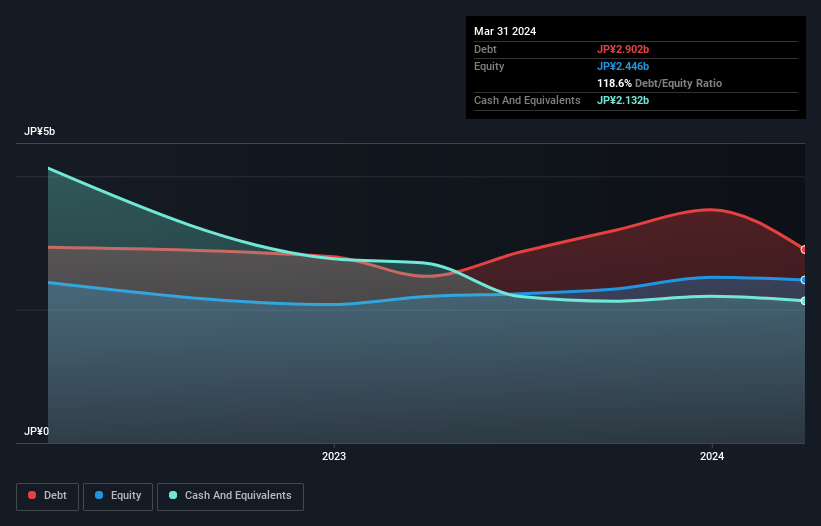
Some say volatility, rather than debt, is the best way to think about risk as an investor, but Warren Buffett famously said that 'Volatility is far from synonymous with risk.' It's only natural to consider a company's balance sheet when you examine how risky it is, since debt is often involved when a business collapses. As with many other companies itsumo.inc. (TSE:7694) makes use of debt. But is this debt a concern to shareholders?
Why Does Debt Bring Risk?
Debt assists a business until the business has trouble paying it off, either with new capital or with free cash flow. In the worst case scenario, a company can go bankrupt if it cannot pay its creditors. While that is not too common, we often do see indebted companies permanently diluting shareholders because lenders force them to raise capital at a distressed price. Of course, debt can be an important tool in businesses, particularly capital heavy businesses. The first step when considering a company's debt levels is to consider its cash and debt together.
See our latest analysis for itsumo.inc
What Is itsumo.inc's Debt?
As you can see below, at the end of March 2024, itsumo.inc had JP¥2.90b of debt, up from JP¥2.50b a year ago. Click the image for more detail. However, it does have JP¥2.13b in cash offsetting this, leading to net debt of about JP¥770.0m.

How Healthy Is itsumo.inc's Balance Sheet?
We can see from the most recent balance sheet that itsumo.inc had liabilities of JP¥3.32b falling due within a year, and liabilities of JP¥1.66b due beyond that. On the other hand, it had cash of JP¥2.13b and JP¥1.37b worth of receivables due within a year. So it has liabilities totalling JP¥1.47b more than its cash and near-term receivables, combined.
This deficit is considerable relative to its market capitalization of JP¥2.44b, so it does suggest shareholders should keep an eye on itsumo.inc's use of debt. Should its lenders demand that it shore up the balance sheet, shareholders would likely face severe dilution.
We measure a company's debt load relative to its earnings power by looking at its net debt divided by its earnings before interest, tax, depreciation, and amortization (EBITDA) and by calculating how easily its earnings before interest and tax (EBIT) cover its interest expense (interest cover). Thus we consider debt relative to earnings both with and without depreciation and amortization expenses.
itsumo.inc's net debt to EBITDA ratio of about 1.7 suggests only moderate use of debt. And its strong interest cover of 22.9 times, makes us even more comfortable. While itsumo.inc doesn't seem to have gained much on the EBIT line, at least earnings remain stable for now. There's no doubt that we learn most about debt from the balance sheet. But it is itsumo.inc's earnings that will influence how the balance sheet holds up in the future. So when considering debt, it's definitely worth looking at the earnings trend. Click here for an interactive snapshot.
Finally, a company can only pay off debt with cold hard cash, not accounting profits. So we always check how much of that EBIT is translated into free cash flow. During the last three years, itsumo.inc burned a lot of cash. While that may be a result of expenditure for growth, it does make the debt far more risky.
Our View
Neither itsumo.inc's ability to convert EBIT to free cash flow nor its level of total liabilities gave us confidence in its ability to take on more debt. But its interest cover tells a very different story, and suggests some resilience. When we consider all the factors discussed, it seems to us that itsumo.inc is taking some risks with its use of debt. While that debt can boost returns, we think the company has enough leverage now. When analysing debt levels, the balance sheet is the obvious place to start. But ultimately, every company can contain risks that exist outside of the balance sheet. Case in point: We've spotted 2 warning signs for itsumo.inc you should be aware of, and 1 of them is significant.
When all is said and done, sometimes its easier to focus on companies that don't even need debt. Readers can access a list of growth stocks with zero net debt 100% free, right now.
If you're looking to trade itsumo.inc, open an account with the lowest-cost platform trusted by professionals, Interactive Brokers.
With clients in over 200 countries and territories, and access to 160 markets, IBKR lets you trade stocks, options, futures, forex, bonds and funds from a single integrated account.
Enjoy no hidden fees, no account minimums, and FX conversion rates as low as 0.03%, far better than what most brokers offer.
Sponsored ContentValuation is complex, but we're here to simplify it.
Discover if itsumo.inc might be undervalued or overvalued with our detailed analysis, featuring fair value estimates, potential risks, dividends, insider trades, and its financial condition.
Access Free AnalysisHave feedback on this article? Concerned about the content? Get in touch with us directly. Alternatively, email editorial-team (at) simplywallst.com.
This article by Simply Wall St is general in nature. We provide commentary based on historical data and analyst forecasts only using an unbiased methodology and our articles are not intended to be financial advice. It does not constitute a recommendation to buy or sell any stock, and does not take account of your objectives, or your financial situation. We aim to bring you long-term focused analysis driven by fundamental data. Note that our analysis may not factor in the latest price-sensitive company announcements or qualitative material. Simply Wall St has no position in any stocks mentioned.
Have feedback on this article? Concerned about the content? Get in touch with us directly. Alternatively, email editorial-team@simplywallst.com
About TSE:7694
itsumo.inc
Provides direct-to-consumer and e-commerce marketing services to brand manufacturers primarily in Japan.
Low and slightly overvalued.
Similar Companies
Market Insights
Community Narratives



